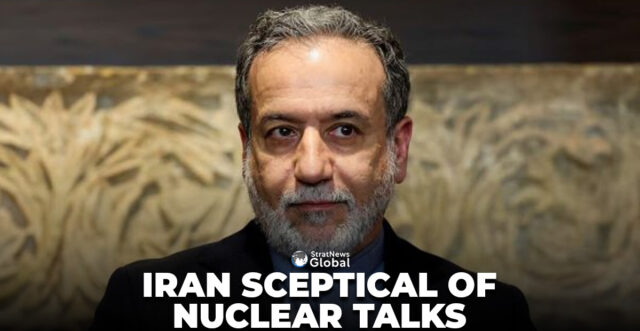Iran is heading into nuclear talks with the United States this weekend with caution and limited expectations, as Iranian officials expressed strong doubts about any progress and mistrust toward U.S. intentions, they told Reuters on Tuesday.
The talks were announced on Monday by U.S. President Donald Trump, who has repeatedly threatened Washington’s old foe Iran with military action if it does not agree to a deal since he returned to the White House in January.
Trump has said the talks on Saturday in Oman will be direct but Iranian Foreign Minister Abbas Araqchi repeated on Tuesday Tehran’s position that they should be indirect, citing what he called U.S. pressure and threats.
“Indirect negotiations can guarantee a genuine and effective dialogue,” he told Iranian state news agency IRNA.
Araqchi said the talks would be led by him and Trump’s Middle East envoy Steve Witkoff, mediated by Oman’s Foreign Minister Badr al-Busaidi.
Tehran Expects Positive Gestures
Tehran would want to see concrete gestures from the United States before any face-to-face talks between Iranian and U.S. officials, Iranian and regional sources said.
“The Iranians told us that direct talks are possible but there has to be a goodwill gesture. Lift some sanctions or unfreeze some money,” a regional diplomat said.
Russia backs either direct or indirect talks between Iran and the U.S. as a chance to de-escalate tensions, Kremlin spokesman Dmitry Peskov said on Tuesday, adding: “We know that certain contacts, direct and indirect, are planned in Oman.”
Russia’s lower house of parliament also ratified on Tuesday a 20-year strategic partnership with Iran, a sign of the deepening military ties between the two countries.
Efforts to settle a dispute over Iran’s nuclear programme, which it says is purely for civilian use but which Western countries see as a precursor to an atomic bomb, have ebbed and flowed for more than 20 years without resolution.
Trump tore up a 2015 deal between Iran and six world powers – the U.S., Russia, China, France, Britain and Germany – during his first term of office in 2017 and talks since then have stalled.
Tensions Over Trump’s Warnings
With the Middle East aflame since 2023 with wars in Gaza and Lebanon, strikes in Yemen, exchanges of fire between Iran and Israel and regime change in Syria, Trump’s warnings of military action have jangled nerves across the oil-exporting region.
In Tehran, Trump’s warnings are seen as a way to box the Islamic Republic into accepting concessions in the talks Trump demands or face air strikes, three Iranian officials said.
They said the U.S. wanted to push other issues too, including Iranian influence across the Middle East and its ballistic missiles programme, which they said were off the table.
“Trump wants a new deal: end Iran’s regional influence, dismantle its nuclear programme, and halt its missile work. These are unacceptable to Tehran. Our nuclear programme cannot be dismantled,” a senior Iranian official said.
“Our defence is non-negotiable. How can Tehran disarm when Israel has nuclear warheads? Who protects us if Israel or others strike?” said another official.
Israel, which has long regarded Iran as its biggest regional threat, defeated Tehran’s Lebanese ally Hezbollah last year and its prime minister, Benjamin Netanyahu, was with Trump on Monday when the U.S. president announced Saturday’s talks.
Netanyahu, who has repeatedly urged U.S. governments to use strikes against Iran’s nuclear programme, said a diplomatic solution would be good if it was done “in a full way”, citing the complete dismantling of Libya’s atomic programme.
Iran has pushed back against Trump’s warnings of military action, saying it will not be cowed by threats.
The Islamic Republic has withstood repeated sanctions programmes over recent decades and Iranian military leaders have previously threatened to cut off regional oil exports – a significant proportion of global energy supply.
(With inputs from Reuters)





